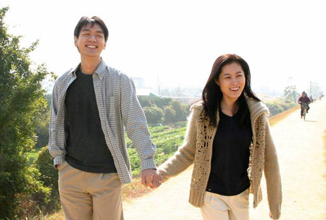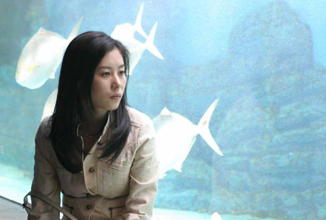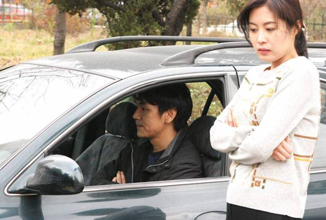"Let's just stop seeing each other. I never expected to say it in a place like this, but I just... I just feel like I'm wasting away..."
Synopsis:
Hyun-jung (Moon So-ri) is in a seemingly blissful relationship with Min-suk (Lee Seon-gyun) and is increasingly considering the prospect of marriage, being almost brow beaten into the idea by her parents. On leaving her work one evening, she is approached by Sang-hoon (Kim Tae-woo), who asks her out only to be casually dismissed by her without a second thought, in spite of her clearly being flattered by the attention. Undeterred by Hyun-jung's rejection, Sang-hoon continues to present her with flowers and business cards (often without a word, and at inopportune moments) to the extent that she begins to see him as rather an intrusive and unwanted pest but, just as she decides that she must put an end to Sang-hoon's amorous advances once and for all, Min-suk unceremoniously ditches Hyun-jung and promptly disappears from her life. Almost out of spite for both Min-suk and her family, Hyun-jung finally agrees to give Sang-hoon the chance he so desperately desires and, though initially having very little in common, they gradually begin to bond - eventually leading to them becoming man and wife, even though Hyun-jung's true feelings for Sang-hoon remain largely unclear to anyone but herself.
On subsequently learning that she is pregnant, Hyun-jung's life seems to be close to perfection once more, but her discovery that Sang-hoon has lied to her on more than one occasion, combined with Min-suk's re-emergence into her life, all add up to thoughts, feelings and deceptions (perceived or otherwise), within both Hyun-jung and Sang-hoon, exploding in a blaze of anger, betrayal and ultimately regret...
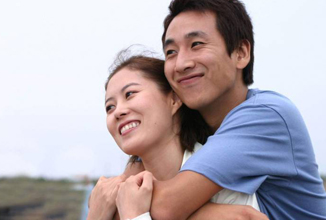 |
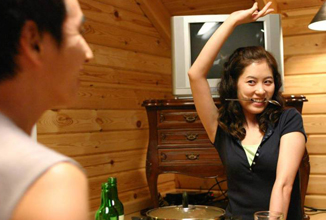 |
Review:
In the early stages of the film, Sa-kwa largely plays as a romance peppered with gentle, realistic humour but even this early on, there are elements of deception (and of perceptions differing from the reality of situations) present for the majority of the main characters; some fairly overt and quickly realised, others less so:
Min-suk's decision to split up with Hyun-jung has clearly been at the forefront of his mind for some time, even though he has hidden it with smiles. As such, it comes as an utter shock to Hyun-jung and she instantly begins to fall apart as a direct result. However, even though she cannot seem to understand why Min-suk never previously (even vaguely) alluded to his true feelings about their relationship, and though she repeatedly teeters between feeling deceived (and betrayed) and blaming herself for doing "something wrong", she completely ignores the fact that she has been, and is being, less than open herself, having subconsciously decided not to tell Min-suk or her family of Sang-hoon's advances, as well as regularly having lied to her parents in order to spend more time with her boyfriend.
In fact, she is even shown to have deceived both Min-suk, and later Sang-hoon, on several occasions and in several ways - some small, some jaw-droppingly large.
Case in point: Having made dinner for Min-suk, she claims that she can do anything once she has tried it, in response to his surprise at her exemplary cooking skills (attempting to show herself to be everything she assumes he wants her to be), but much later in proceedings, when Sang-hoon asks a similar question, she claims that she can't cook at all - desperate, as she is, to end his infatuation with her. A minor example, perhaps, but it still speaks volumes to the ease with which Hyun-jung and, in fact, the majority of the main characters subconsciously allow themselves to alter the personas they show to others, to suit their own wants and needs at any given time. While the size and importance of their deceptions quickly grow, the characters' actions regarding themselves and those around them still continue to fit exactly the same pattern as those resulting from even the tiniest of "secrets".
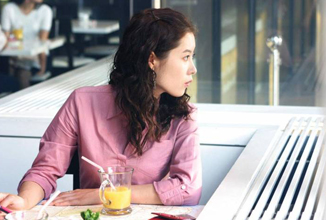 |
 |
As the characters' stories further unfold, the unspoken deceptions (and feelings of having been deceived) invariably build, one on another, to breaking point and beyond, and, just as those hidden and bottled up feelings must inevitably rise to the surface sooner or later, with them must come the resultant guilt, regret and ultimately the need to finally set things right, once and for all.
Within the main plotline of Sa-kwa, there are also numerous references to family, social etiquette, responsibility (of both parents and offspring) and the importance of at least appearing to behave in a manner which society would approve of: Throughout Hyun-jung's relationships with both Min-suk and Sang-hoon, her parents repeatedly comment on the need for her to be married (before her younger sister), on the importance of being gainfully employed and on being seen to be fitting in with society's moral ideals, and even here the ongoing ideas of lies, deception and regret are clearly apparent.
 |
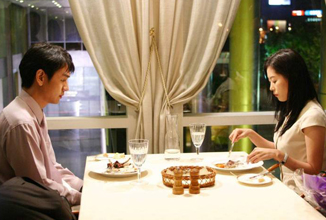 |
Kang Yi-kwan's assured and intimate direction makes the fairly involved plot of Sa-kwa an utter pleasure to indulge in throughout. Never languishing, the film effortlessly recounts the intricacies of the lives of the main characters at an almost perfect pace.
The accompanying musical score expertly traverses the lines between playful, angst-ridden and poignant - largely using restrained instrumentation within simple orchestrated melodies which subtly change (often just by morphing from major to parallel minor), thereby enabling the accurate mirroring of emotions playing visually on screen, and this adds further to the accomplishments of the numerous other elements within Sa-kwa to ensure that the film is a feast for the ears as well as the eyes and the mind.
The literal English translation of "Sa-kwa" is both "apology" and "apple", and, to my mind, it is likely that the decision to keep the English title the same as the Romanised Korean is an attempt to bring the ideas of the different possible meanings of words and statements (and what the truth behind them actually is, or is not) as is experienced by the characters in the film, to the fore. Of course, it could be alleged that the title also serves as an oblique biblical reference to forbidden fruit, but even though there is indeed a scene in which Hyun-jung (pregnant with Sang-hoon's child) presents Min-suk with an apple, it is given to him as he leaves (being placed unopened in his bag), and rather feels like the addition of a layer of deliberate ambiguity, rather than appearing to signify anything related to biblical loss of innocence or original sin.
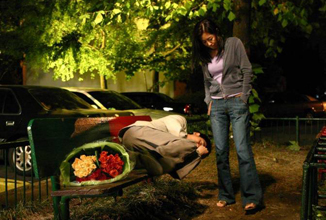 |
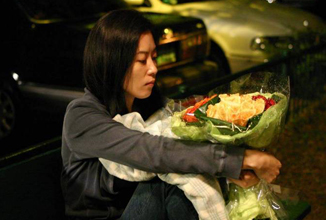 |
Cast:
Moon So-ri (as Hyun-jung) utterly owns Sa-kwa and her performance underlines the power within the layered and ever-twisting plot. Not only that, but her portrayal is so strong that each and every one of the other cast members must pull out all the stops to step up to the level which she sets and repeatedly raises. From fun loving and happy in the early stages of the film; to forlorn and broken after Min-suk breaks up the relationship; to confused, deceived (and deceiving); Moon So-ri manages to show the heart and soul of her character throughout.
Among her most memorable scenes (though there are many) are the moment that Min-suk tells her that he wants to end their relationship (where viewers are almost able to actually watch Hyun-jung's heart breaking), and the scene where she attempts to email Min-suk - gradually breaking down with each successive sentence she writes and subsequently deletes.
Lee Seon-gyun (as Min-suk) and Kim Tae-woo (as Sang-hoon) both give accomplished performances which easily exceed expectations, but Sa-kwa is without question Moon So-ri's film, plain and simple.
Cast: Moon So-ri, Kim Tae-woo, Lee Seon-gyoon, Joo Jin-mo
Summary:
A constantly twisting plot detailing the intricacies of human deceit, betrayal, anger and regret, Sa-kwa is an astounding film, and there's no deception whatsoever in that statement.
Note: Sa-kwa was originally made in 2005 but didn't receive a theatrical release until 2008.
DVD
The DVD
edition reviewed here is the Korean (Region 3) Paxmedu Single Disc release. The film itself is
provided as an anamorphic transfer with an aspect ratio of 1.85:1 and there are no image artifacts (and no ghosting) present.
The original Korean
language soundtrack is provided as a choice of Dolby Digital 5.1 and Dolby Digital 2.0 and both are clear and well balanced giving full justice to the beautifully understated musical score.
Excellent subtitles are provided
throughout the main feature but English-speaking viewers should note that, as with many Korean DVD releases, there are no subtitles available on any of the extras.
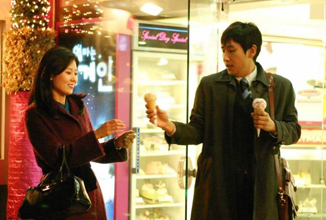 |
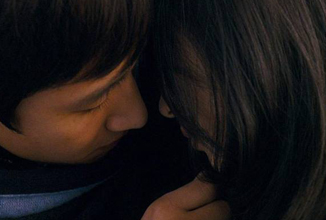 |
DVD
Details:
• Director: Kang Yi-kwan
• Format: NTSC,
Anamorphic, Widescreen, Subtitled
• Language: Korean
•
Subtitles: English/Korean/None
•
Sound: Dolby Digital 5.1, Dolby Digital 2.0
• Region: Region 3
• Aspect Ratio:
1.85:1
• Number of discs: 1
• Classification: 15 (Korean Film Classification)
• Studio:
Paxmedu
• Run Time: 118 minutes (approx.)
DVD Extras:
- Interviews
- Deleted Scenes
- Theatrical Trailer
|










